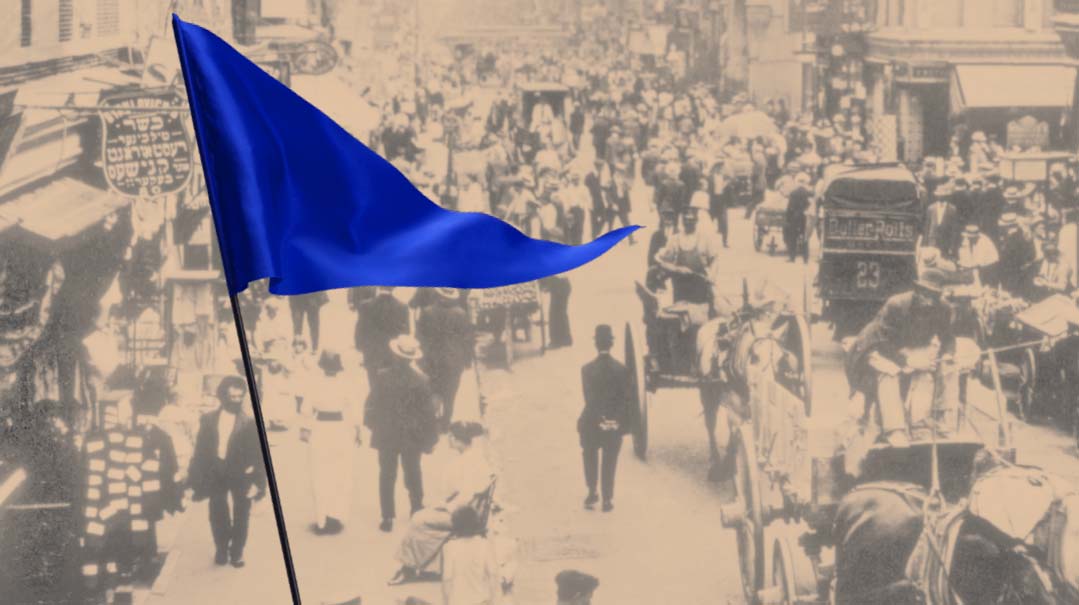A Kosher Home
| November 30, 2021“Mi l’Hashem elai!” In every generation, there are those who respond and take a stand for Hashem

My bubby raised her family in America in the ‘50s and ’60s, an era when authentic Judaism was on the decline. Her hometown, North Adams, Massachusetts, was a small town nestled in the Berkshires, nearly 200 miles from central New York with its day schools and yeshivos and shtibels.
Compared with the large communities in Brooklyn, the North Adams enclave was minuscule, almost a rounding error in size. And while many of New York’s Jews were recent immigrants, the fire of the alter heim still warming their bellies, North Adams’ Jews were second or even third generation Americans, their zeal for “the world that was” substantially dimmed.
Years later, when recounting those years, one of Bubby’s frequent declarations, spoken with the conviction and pride of a conquering general, was: “I kept a kosher home.”
Bubby’s mother, like most of her generation, “kept a kosher home,” but many of Bubby’s contemporaries saw the effort as more of a hassle than it was worth. With kosher superstores and overnight refrigerated shipping as realistic as commercial space travel, Bubby’s only recourse was the old-fashioned kosher butcher.
In the early years, Sam Kronik operated a local kosher butcher, a convenience that was unfortunately not sustainable, given the dwindling North Adams Kosher clientele. Once Sam shuttered his store, a new era dawned: Bubby’s kosher butcher expeditions. A two-hour trip by car, Springfield, Massachusetts was home to Bubby’s beloved parents and, providentially, a kosher butcher.
Bubby began bridging her filial responsibilities with her epicurean duties, and made the trip to Springfield regularly, returning with her car packed with fleish. Thus her vow to keep a kosher home endured.
However, Bubby’s parents grew old and passed on, and likely the kosher butcher shop followed suit. Albany, New York became the new kosher butcher destination of choice. Those years coincided with my childhood.
I remember Bubby’s basement as a musty, dim, unremarkable space, save for two retro white freezers. They were vintage at its best, with a rounded belly and a long silver pull handle, and they warehoused Bubby’s abundant supply of kosher meat, ensuring fewer trips to Albany.
Bubby spoke frequently of these trips, and it seemed that whenever we came up to North Adams for a visit, she’d just returned from, or was planning to embark on, yet another pilgrimage to New York’s capital city.
Her trips were never solely for herself; Bubby took orders from the few women in North Adams who also “kept a kosher home” and ferried their meat back from the big city as well.
Kashrus was an emotionally evocative thing for my Bubby. When her dear friend Jackie ceased to “keep a kosher home” following her parents’ demise, my Bubby was distraught. Dropping kashrus was a proverbial line in the sand, and for years Bubby correlated the intermarriage of Jackie’s children with her kashrus defection.
When a new product gained kosher certification, Bubby’s joy was boundless. I distinctly recall her enthusiasm when “Richy’s” (her diminutive for Rich’s whip) went kosher, and remember overhearing conversations lauding the uses of olio (margarine) as a substitute in fleishig recipes. Whenever we’d pull in to her home following a four-hour journey from New York, she’d be handing out Price Chopper vanilla ice cream bars, proud as a peacock that they now bore an OU.
When Bubby and Zaydie visited us, they never ceased to be amazed at the kosher abundance we took for granted: bagels and pizza, bakeries and burger joints, all strictly verboten in North Adams if you “kept a kosher home.”
If there’s a lesson to be learned from my Bubby’s battle cry, I’m skeptical that it has anything at all to do with kashrus. We can bemoan today’s gastronomic hedonism, when compared with the culinary slim pickings of yesterday’s out-of-town Jews. But I think the instructive runs deeper.
When we ponder the Jewish heroes of early 20th century America, we conjure the deeply pious men and women who coaxed Torah and Yiddishkeit from streets stubbornly paved in gold, the ones who built our yeshivos and Beis Yaakovs brick by brick, ultimately cultivating today’s American Olam HaTorah. They’re the household names we utter with reverence, whose faces hang on our walls and names line our bookshelves. And very justifiably so. We owe them both our present and our future.
But there’s another genre of Jewish American heroes, individuals who knew close to nothing, save for the tepid drops of Judaism that survived a transatlantic journey eons ago. Lacking proper education and role models, they weren’t bastions of halachic authority or fidelity. But their mesirus nefesh to keep what they did know while so many of their peers shed observance, confers them a hero’s status all their own.
They’re the ones who “kept a kosher home.” And I undoubtedly owe them both my present and my future, as well.
(Originally featured in Family First, Issue 770)
Oops! We could not locate your form.







